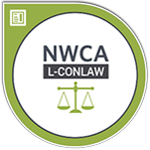PURPOSE
The Constitutional Law credential documents the essential competencies and knowledge related to powers granted by the U.S. Constitution and structures it creates, as well as the individual rights protections it affords U.S. citizens.
AUDIENCE
This credential is appropriate for a professional who requires knowledge of the U.S. Constitution and its provisions related to individual rights to support a career position including historians, teachers, community educators, political scientists, paralegals, law clerks, lobbyists, and public interest advocates.
JOB/CAREER REQUIREMENTS
Credentials in Constitutional Law document competencies including knowledge of the U.S. Constitution’s creation of facilities and structures for the separation of powers, allocation of powers between federal and state government, judicial review, congressional authority, presidential and agency powers, and protections of individual rights. Though many of these positions require appropriate education at various levels and additional training, a fundamental understanding of constitutional law provides a foundation that supports many aspects of daily tasks and decision-making.
CONSTITUTIONAL LAW WORKPLACE TASKS:
- Historians gather and analyze historical data, engage public in educational programs, archive and preserve materials and artifacts, provide guidance on historical topics and preservation issues, and write reports, articles, and media pieces on historical topics.
- Teachers and community educators research political topics, develop curricula, present educational lessons using a variety of formats and at many different levels of education, and evaluate learning.
- Political scientists research and study political subjects, collect and analyze data, monitor current events and policy decisions, evaluate effects of policies on the people, and present research through reports, presentations, and articles, other methods.
- Paralegals and law clerks research legal issues, write opinions based on research, participate in the formation of case law, assist judges and attorneys with courtroom proceedings, manage evidence, and interact with participants in the legal process.
- Lobbyists analyze information from non-governmental organizations, governments, think tanks and other research organizations, prepare policy statements, advise clients on policy issues and liaise with issue stakeholders.
- Public interest advocates research public policy issues to support their work on behalf of interest groups, to influence public policy, and raise public awareness of issues they believe are in the public interest.
EXAM STRUCTURE OVERVIEW
Number of Questions in Exam: 60
Total Time: 45 minutes
Overall Passing Score: 70%
(All sections require an individual passing score of 70%)

